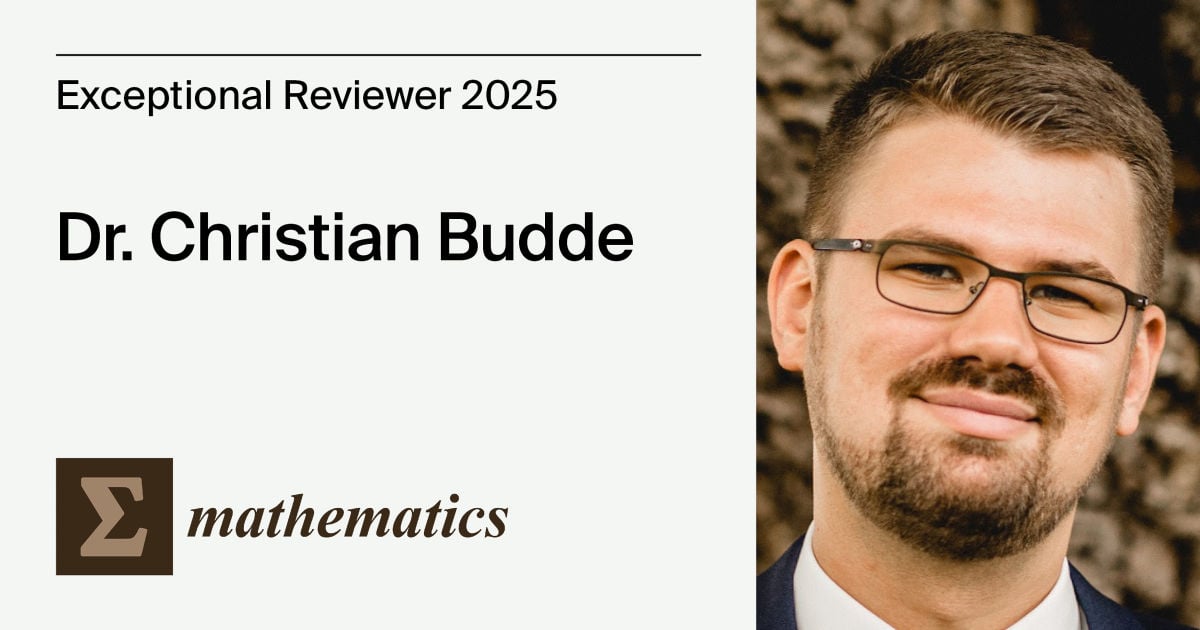
Journal Menu
► ▼ Journal Menu-
- Mathematics Home
- Aims & Scope
- Editorial Board
- Reviewer Board
- Topical Advisory Panel
- Instructions for Authors
- Special Issues
- Topics
- Sections & Collections
- Article Processing Charge
- Indexing & Archiving
- Editor’s Choice Articles
- Most Cited & Viewed
- Journal Statistics
- Journal History
- Journal Awards
- Society Collaborations
- Conferences
- Editorial Office
Journal Browser
► ▼ Journal BrowserNeed Help?
Announcements
4 September 2025
Interview with Dr. Christian Budde—Mathematics Exceptional Reviewer

Name: Dr. Christian Budde
Affiliation: University of the Free State, South Africa
Research Interests: evolution equations; operator semigroups; functional analysis
Mathematics (ISSN: 2227-7390) is thrilled to share an interview with one of our 2025 Exceptional Reviewers, Dr. Christian Budde, who is a Senior Lecturer in the Department of Mathematics and Applied Mathematics at the University of the Free State in South Africa.
The following is a short interview with Dr. Christian Budde:
1. Could you introduce your current research direction and provide an update on your progress?
My research lies at the intersection of functional analysis and partial differential equations, with a particular focus on evolution equations, operator semigroups, and applications to large network dynamics. Recently, I have also been developing interdisciplinary projects, reflecting my broader interest in the applicability of mathematics beyond traditional boundaries. At present, much of my work is devoted to advancing the theoretical understanding of evolution equations in complex structures, while also building bridges to applied contexts where these tools can provide real insights.
2. Can you please share with us your sentiments upon winning the award?
I am deeply honored to be selected as an “Exceptional Reviewer”. Peer review is a cornerstone of academic life and an essential element in ensuring the rigor and integrity of our discipline. To have my efforts in this regard acknowledged is both humbling and motivating. It reaffirms for me that the time and care invested in the review process—often invisible to the wider community—are meaningful contributions to the advancement of mathematics.
3. Could you share some insights into your approach to reviewing manuscripts? How do you balance thoroughness with efficiency?
My approach to reviewing is guided by two principles: fairness and clarity. I try to place myself in the position of both the author and the reader. From the author’s perspective, constructive feedback is essential, not only to highlight areas that need improvement but also to recognize the strengths of the work. From the reader’s perspective, I ask whether the manuscript contributes something substantial, is clearly presented, and will be accessible to its intended audience. Balancing thoroughness with efficiency comes down to structured reading: I first develop a broad understanding of the manuscript’s main results and contributions and then proceed carefully through the technical details. This ensures that my review remains both comprehensive and timely.
4. What are the key factors and aspects that you consider most when reviewing a manuscript?
I pay particular attention to mathematical rigor, originality, and clarity of exposition. Rigorous arguments are the foundation of our discipline, and it is crucial that every step withstands scrutiny. Originality is equally important—whether in developing new theory, offering fresh perspectives, or providing applications that open new avenues for exploration. Finally, clarity ensures that these contributions can be appreciated and built upon by the community. A well-written paper not only communicates ideas but also invites collaboration and further research.
5. Based on your experience, which research topics do you think are of particular interest to the research community in the coming years?
I believe that research at the interface of pure and applied mathematics will continue to gain momentum. Topics such as the analysis of large networks, the mathematical modeling of complex systems, and the interplay between abstract operator theory and data-driven applications are areas of growing interest. Additionally, interdisciplinary approaches—where mathematics informs and is informed by other fields—will play an increasingly vital role. For me, this reflects one of the most exciting aspects of mathematics: its ability to provide both deep theoretical insights and powerful tools for understanding the world around us.



